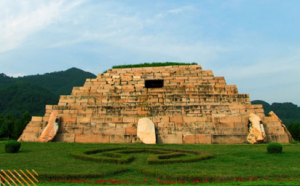澳門:中西合璧之城 游子歸國20年騰飛(2)
Macao was thought to get its name from A-Ma Temple, a temple to the Chinese sea-goddess Mazu. In the 16th century, when the Portuguese landed near the A-Ma Temple and asked the name of the place, the local residents replied Maa-gok or A-maa-gok (literally meaning the Pavilion of the Mother). Hence came the name of Macao.
獨(dú)特的歷史讓澳門成為了一座既古典又現(xiàn)代的中西合璧之城,。澳門半島上聚集了大三巴,、炮臺(tái)、玫瑰堂等文化景點(diǎn),;街道上狹窄的石子路,、盤根錯(cuò)節(jié)的榕樹、觸手可及的斑駁墻壁,、巴洛克式的雕花裝飾,,都藏著澳門訴不盡的故事。城市的另一邊則是另外一幅畫面——?dú)胱袓u上坐落著一座座奢華的高級酒店,,通宵不熄的娛樂場燈光,、極其現(xiàn)代的購物商城都在向游客詮釋著另外一個(gè)澳門。
Today, the city is classical and modern at the same time. It is a harmonious combination of Chinese and Western elements. On the peninsula of Macao, one can enjoy cultural attractions such as the Ruins of Saint Paul’s, Mount Fortress, Macao Rose Hall, and etc. It seems you can feel the history on those narrow cobbled streets, old banyans with twisted roots and gnarled branches, mottled walls, and Baroque decorations. But on the other side of the city, on Ilha da Taipa, stand various grand, luxury hotels, brightly lit entertainment centers, and modern shopping malls, telling you the modern story of Macao.
今年正逢新中國成立70周年,,澳門回歸祖國20周年,?!镀咦又琛吩俣瘸?,用深情的旋律講述著澳門與祖國血脈相連不可分割的情感,講述著澳門回歸20年來的萬象更新蓬勃發(fā)展,。
This year marks the 70th anniversary of the founding of the People’s Republic of China and the 20th anniversary of Macao’s return to the motherland. The Song of the Seven Sons is resounding again in the air. It tells the inseparable bond between Macao and its motherland and the city’s tremendous changes and robust development in the past 20 years.














